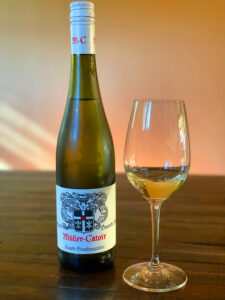2018 Weingut Mueller-Catoir, Grauburgunder Trocken, Haart, VDP Ortswein, Pfalz Germany.
The crisp and steely Mueller-Catoir Grauburgunder (Pinot Gris) is very much like its Alsatian cousins, reminding me of the outstanding offerings from Marcel Deiss, Trimbach and Zind-Humbrecht with a hint of petrol, green apple, quince and racy citrus leading the way here in the 2018 vintage from the famous Heart vineyard in the Pfalz. Germany is not a one trick pony, there is many grapes thriving here now besides Riesling and the level of quality for these other whites has risen considerably in recent times, especially varietals like Pinot Blanc, Pinot Gris, Sylvaner (Silvaner), Muscat, Scheurebe, of which Mueller-Catoir does fantastically well, along with now Chardonnay and Sauvignon Blanc, both of which are showing huge potential here in the Pfalz. This wine is, as the Winery notes, all vegan and comes from hand-picked and organically cultivated grapes in the Haart Vineyard that has an underpinning of sandstone soils. The briskly focused Mueller-Catoir Grauburgunder saw a cool fermentation in stainless steel and was partially matured in old wooden barrels to enhance textural quality which shows as this wine opens up in the glass, adding a nice fuller dimension. With air this Pinot Gris gains hints of mineral, zesty apricot, ground seashells, plus a touch of earth, clove and a woodsy elegant, making for a serious version of this grape and one that goes great with a variety of dishes, like soft cheeses, briny sea food and poultry.
The Mueller-Catoir Rieslings are some of Germany’s best, but they also have some intriguing alternative whites that deserve attention, like their awesome Scheurebe Torocken, this Grauburgunder (Pinot Gris) as well as a great dry Muscat (Muskateller), which is a favorite of mine, and maybe the best I’ve ever had, along with Weissburgunder (Pinot Blanc) and Rieslaner (a rare varietal, that in spite of the name is not in fact related to Riesling!), and of which they do a fabulous sweet wine version. Weingut Mueller-Catoir has been family owned since 1774 with 9 generations tending the vines, as Theise notes, the winery is now run by Philipp David Catoir, who has Martin Franzen as his cellar master, hailing from the Mosel and formerly at Schlossgut Diel, took over the winemaking from the legendary Hans-Günther Schwarz in 2002. Müller-Catoir has gone holistic in recent years and farm mostly organic, but remain very practical with absolute quality demanded of the grapes here, there is no compromise at this place, they focus on purity and terroir. The vineyards in Haardt, where this wine comes from, are composed of primary rock (urgestein) and sandstone, with an increasing proportion of gravel lower on the slopes. This estate and the region has a long history of winegrowing with the Burgergarten site being first planted close to 700 years ago, and, as the winery notes. Mueller-Catoir which has a tradition of reductive winemaking implementing a gentle crush, a long skin contact, slow gentle pressing, and then ferments at warmer fermentation temperatures in stainless steel to promote transparency along with classic used oak casks that allows for a round mouth feel. Mueller-Catoir is one of the best winery’s in Germany and their wines are outstanding, I highly recommend exploring their whole range, this wine included.
($28 Est.) 92 Points, grapelive
